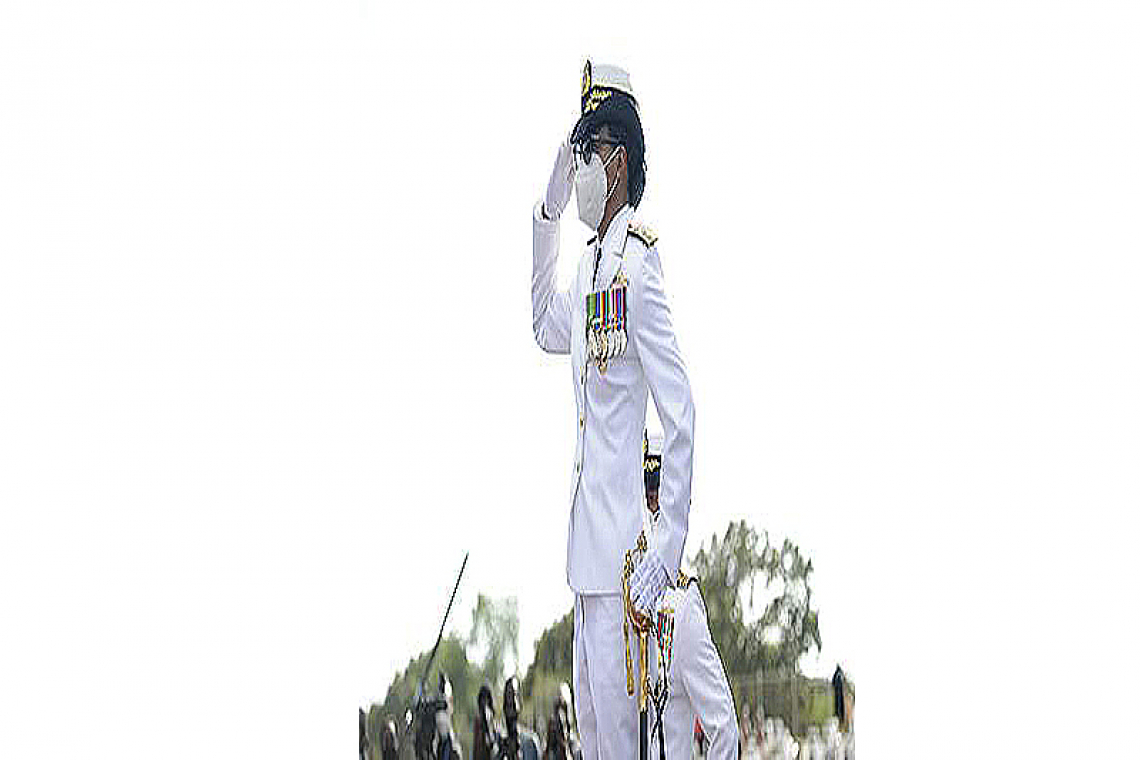Rear Admiral Antonette Wemyss Gorman. Jamaica Defence Force photo, courtesy the “Jamaica Observer”.
KINGSTON, Jamaica--As the first woman to run Jamaica’s military, Rear Admiral Antonette Wemyss Gorman has faced down danger and sexism in her 29-year career but hasn’t let gender hold her back.
“I was never focused on the fact that I was a woman,” she told the Thomson Reuters Foundation in her immaculate Kingston office at the Jamaica Defence Force headquarters.
Calm, compact and wearing full camouflage fatigues, the newly installed defence chief is more at home in the field than at the grand, wooden desk that goes with her top job.
“I think a lot of times women make a mistake of focusing on their gender and cause their own limits in what are they doing.”
Wemyss Gorman became the world’s only serving female national chief of defence in January – and only the second woman globally to hold such a prominent position after a Slovenian made history with her two-year term in 2018.
Now Wemyss Gorman has 7,000 men and women under her charge, with a day job ranging from cybersecurity to youth engagement.
Nothing seems to phase her.
Though the 49-year-old is quick to downplay her personal achievement, she readily acknowledges its wider symbolism.
For Jamaica is a deeply patriarchal society, according to Nadeen Spence of The University of the West Indies, where male dominance shapes its institutions as much as daily life.
Spence said she would not describe Jamaica as macho, and that female role models do exist – just not in the top spots.
“It [this appointment – Ed.] is important for the nation at large and women in general because it tells you that this is a space that women can now go into,” said Spence.
Women in Jamaica hold most management positions, do better in education and rise higher than men in some areas, Spence said, but they still bear the brunt of domestic duties.
Her advice? Just hang in there, said Wemyss Gorman.
“It is significant for women who want to serve, or who are serving, to see that they can achieve if they stay long enough and they work hard enough,” she said.
Divorced with a 15-year-old son, Wemyss Gorman often wakes at 4:00am, using the quiet time to garden, let her mind shut down and bury her hands in the soil.
“I can think – or not think,” she said.
Adventurous child
Born in rural Jamaica in 1972, Wemyss Gorman was raised by grandparents while her mother worked overseas to pay for school.
A self-described adventurous child who never shirked a challenge, her role models were the “strong women” all around her: her mother, grandmother and teachers.
In part due to them, along with an innate determination, Wemyss Gorman was oblivious to any limitations of her gender.
“I wasn’t socialised that way,” she said.
After taking a customer service job at 17, Wemyss Gorman researched the military, something that had always appealed.
Never mind that no woman had served in the coast guard before, Wemyss Gorman persuaded several commanders she knew to take her on.
“I couldn’t understand it and I wasn’t about to accept it either,” she said.
For several years, she was the only woman in the coast guard; a calm head and steady hand drove her ever upwards.
Both traits were on show when, as a young captain on a mission to rescue fishermen from a tropical storm, her ship’s engine cut out mid-operation.
“We were becoming more and more in imminent danger of being overcome by the effects of the storm,” she recalled.
Wemyss Gorman steered her engine-less ship to safety and accomplished the mission, before moving steadily up the ranks – despite the scepticism of many colleagues.
“I had comments from senior officers who didn’t think it was a good idea. They openly expressed that this experiment was going to fail,” she said.
So far, so wrong – and now Wemyss Gorman wants to open the hatch to other women who want to get on in the military.
One in 10 of the island’s defence personnel are women, with a 25 per cent “gender optimisation” policy in place.
A good start, said Wemyss Gorman, her bun neatly slicked back and no hair out of place. But not enough, she said. “We want to get to a stage where we don’t need to have a quota.” ~ Reuters ~







